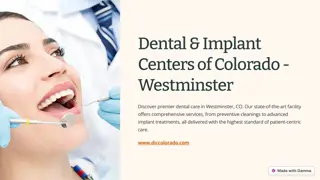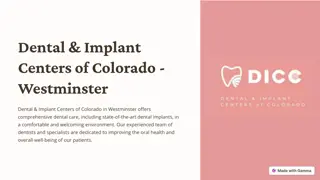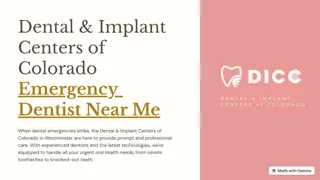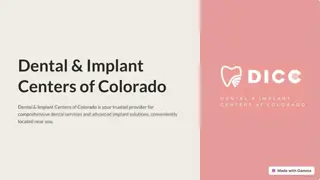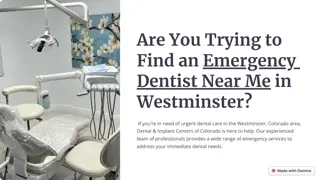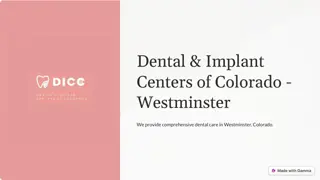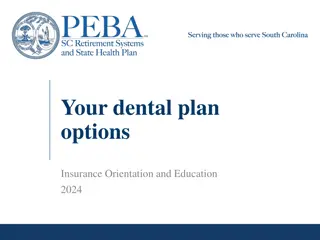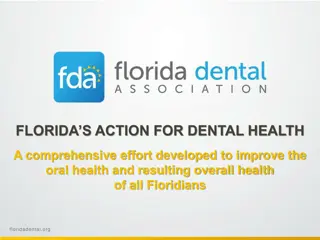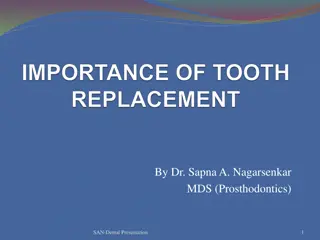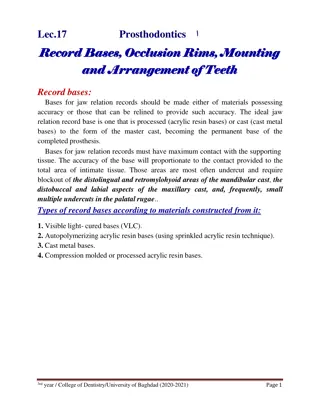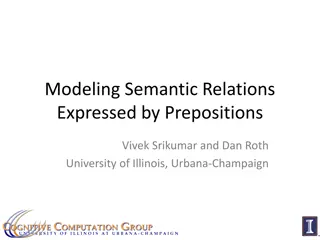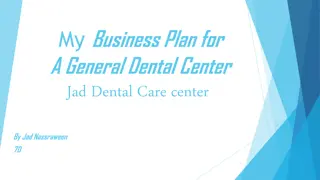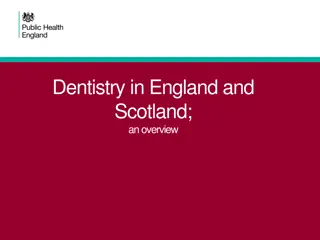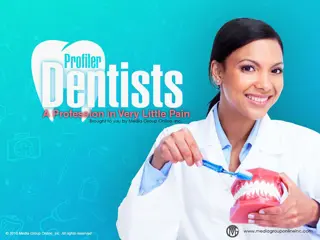Understanding Dentist-Laboratory Relations in Dental Prosthodontics
The relationship between dentists and dental laboratory technicians is crucial for the successful fabrication of dental prostheses. Dentists delegate the construction of prostheses to technicians based on instructions, but lack practical experience in framework construction. Proper communication and work authorizations are essential for quality outcomes in removable partial denture service, as technicians require clear guidance to produce satisfactory results. Expectations should be realistic, as technicians lack clinical judgment skills to design frameworks.
- Dentist-Laboratory Relations
- Dental Prosthodontics
- Laboratory Technicians
- Work Authorizations
- Communication
Download Presentation

Please find below an Image/Link to download the presentation.
The content on the website is provided AS IS for your information and personal use only. It may not be sold, licensed, or shared on other websites without obtaining consent from the author. Download presentation by click this link. If you encounter any issues during the download, it is possible that the publisher has removed the file from their server.
E N D
Presentation Transcript
RUNGTA COLLEGE OF DENTAL SCIENCES AND RESEARCH Definitive analysis of master cast,work authorization to dental technician Dept of Prosthodontics 3rd Year BDS Presented By: Dr.Shilpi Karpathak Professor Dept of Prosthodontics
Specific Learning Objective Core areas Domain Category Introduction Cognitive Must Know Dentist-Laboratory Relations Training of Laboratory Technicians Registration of Laboratories Work Authorizations Design of written work authorizations Infection Control for the Dental Laboratory Laboratory Procedures Cognitive Must Know Summary Affective Must Know
Contents Dentist-Laboratory Relations Training of Laboratory Technicians Registration of Laboratories Work Authorizations Design of written work authorizations Infection Control for the Dental Laboratory Laboratory Procedures Retripoding the master cast Heights of contour
Design transfer Block out and relief Cast preparation
Dentist-Laboratory Relations The fabrication of a removable partial denture framework in contemporary dental practice is routinely delegated to a commercial dental laboratory. Dental schools rarely provide practical experience in framework construction techniques. Therefore, most dentists possess only a superficial understanding of the exacting procedures required to produce a quality casting
For a prearranged cost, a dental laboratory technician constructs a prosthesis or appliance according to the dentist s instructions. In most instances, the dental laboratories that construct removable partial denture frameworks are large, serve many dentists, and produce as many as 50 frameworks per day. In fact, they are usually not located in the same city, which puts a strain on communication between dentist and technician. Therefore, a properly completed work authorization is a critical component in the overall success of removable partial denture service.
The dentists expectation that the technician perform tasks requiring clinical judgment is unfair and may be illegal if the technician is asked to design the partial denture framework as well as construct it. Even with years of experience in the construction of partial dentures, the technician has no experience in assessing the clinical results of prosthodontic treatment and has no first-hand clinical data from which to personalize therapy. They made, the technician is likely to think only of construction issues and not the long-term effects of removable partial denture service
Manipulation of dental materials, casting and finishing techniques, and repair of existing partial dentures are but a few examples of where the technician s knowledge may exceed that of the dentist. A good working relationship between the dentist and the dental laboratory technician permits the construction of quality prostheses and the delivery of quality care
Training of Laboratory Technicians In Dental Laboratory Technology may be examined voluntarily in one or more of five areas of expertise in the laboratory field: complete dentures, removable partial dentures, fixed partial dentures, ceramics, and orthodontics.
Registration of Laboratories The purpose of the certification would be to control the quality of technical work performed. Where quality is inadequate, the laboratory suffers the same consequences as any business that does not satisfy its customers ultimate failure. However, most states do require the registration of dental laboratories and individual dental laboratory technicians
Work Authorizations All states require that requests for dental laboratory services be accompanied by written instructions. The minimum information required by most states includes: (1) the signature and license number of the dentist, (2) the date the authorization was signed, (3) the name and address of the patient (because of privacy laws, some states require only a patient identification number) (4) a description of the service or material ordered
Design of written work authorizations Forms are designed to be uncomplicated and to minimize the necessity for additional writing. Most forms are generated using pressure-sensitive papers so that copies of work authorizations are immediately available for the dentist and dental laboratory personnel. To be useful, a work authorization order must be legible, concise, and easily understood. Information that is of little value to the technician should be avoided
Insufficient information, coupled with the dentists potentially unrealistic expectations, often leads to clinical disappointment and inadequate prosthetic service. Casts for removable partial dentures may be submitted for framework construction, resubmitted for arrangement of prosthetic teeth, and submitted yet again for processing and finishing the denture bases. Therefore, it is wise to use a new work authorization order each time the cast is submitted to the dental laboratory.
To help the laboratory identify the cast as it passes through the laboratory, the form should have the doctor s and patient s names prominently displayed. The work authorization order should accurately communicate the positions of all removable partial denture components. To accomplish this, the removable partial denture design should be drawn on the appropriate portion of the work authorization order.
The drawing should identify all missing teeth. Teeth to be replaced by the removable partial denture should be darkened using a pen. Teeth that are not to be replaced should be identified by placing a large X through the crown form. The major connector should be drawn to the desired size and shape, and the configuration of the clasps should be included.
The placement of denture bases should be accurately indicated. Among the purposes of the diagrammed design are : (1) to remind the technician of the prescribed design and (2) to provide a form of identification in the event that the dental casts and the case pan become separated while in the dental laboratory
The work authorization order should clearly identify the major connector to be used. In addition, the practitioner should list the teeth to be clasped, the type of clasp to be used (eg, cast circumferential clasp, combination clasp, I-bar, or T-bar), and the amount of undercut that each clasp assembly must engage
The selection of prosthetic teeth must be handled very carefully. The dentist should indicate the size and number of artificial teeth to be used as pontics. The type of artificial tooth and the material from which it is made, such as porcelain or resin, must be indicated. The desired tooth shade and the manufacturer of the shade guide should be listed. Perhaps the most important portion of the written work authorization is the Remarks and Special Instructions section.
The dentist should use a polite and respectful tone when submitting a work authorization order to the dental laboratory. Whether or not the dentist assumes the proper degree of responsibility in designing and supervising the laboratory phases of partial denture construction, the legal weight of patient treatment rests entirely on the dentist, not on the technician.
Infection Control for the Dental Laboratory Dental laboratories must establish and maintain appropriate infection control programs
Laboratory Procedures For successful construction of a removable partial denture, the dentist must provide dental laboratory personnel with the following: (1) a written work authorization describing the desired prosthesis , (2) a properly surveyed diagnostic cast with an appropriate removable partial denture design (3) a properly articulated master cast that provides an accurate reproduction of existing hard and soft tissue contours. Anything less will compromise quality and adversely impact patient care
Summary For successful construction of a removable partial denture, the dentist must provide dental laboratory personnel
References Stewert s Clinical Removable Partial Prosthodontics, 4th Edition Textbook of Prosthodontics, V.Rangarajan 2nd Edition








